

Green Technology and Environmental Science News: Study reveals climate patterns have impact on flu epidemics. The flu season has been hitting hard this winter all across the country with nearly 30 states reporting flulike activity and over 2,200 people being hospitalized according to government health experts.
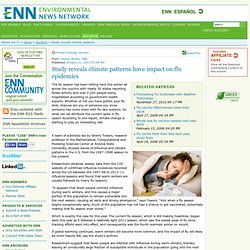
Whether or not you have gotten your flu shot, chances are you or someone you know someone has come down with flu-like systems. So what can we attribute the current spike in flu cases? According to one report, climate change is starting to play an interesting role. The Baffling Nexus of Climate Change and Health. Associated PressA plane sprayed insecticide over Dallas last month to kill mosquitoes and limit the spread of West Nile virus.

In 2004, a rare tropical fungus caused a string of respiratory failures and neural disorders along the Pacific Northwest coast, baffling the health community. That same year, Alaskan cruise ship passengers dining on local oysters fell sick with a gastric virus typically found in warm water estuaries. Now Texas, after an unusually wet spring and dry summer, is battling what may become the country’s worst recorded outbreak of West Nile virus. Meteorological and ecological shifts driven by climate change are creating a slow and often unpredictable bloom of novel public health challenges across the United States.
The American Public Health Association has declared climate change “one of the most serious public health threats facing our nation,” although the precise nature of that threat remains uncertain. The short-term challenge, Dr. Climate changes could bring malaria to the UK. Leading health experts are urging the government to take action against the growing threat that mosquito-borne diseases, including potentially fatal malaria, could soon arrive in the UK.
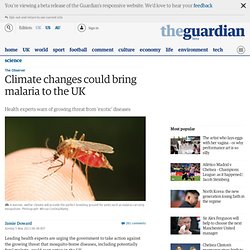
The disturbing recommendation to "act now before it is too late" is being made as a growing body of evidence indicates that what were once thought of as tropical diseases are being found ever closer to the UK. Health experts meeting at the annual public health conference of the Chartered Institute of Environmental Health later this week will hear that rising incidences of a growing list of pest-borne diseases are now a "serious" cause for concern in the UK. The conference will be told that it would be complacent to think that diseases such as dengue fever, malaria and Crimean-Congo haemorrhagic fever, now present on the European continent but once considered "exotic and confined to faraway places", will not emerge in the UK.
Barratt said the government could not afford to be complacent. Climate change and influenza: the likelihood of early and severe influenza seasons following warmer than average winters – PLOS Currents Influenza. The 2012-13 influenza season had an unusually early and severe start in the US, succeeding the record mild 2011-12 influenza season, which occurred during the fourth warmest winter on record.
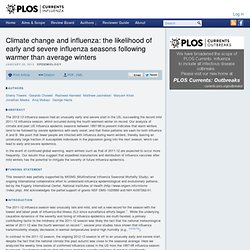
Our analysis of climate and past US influenza epidemic seasons between 1997-98 to present indicates that warm winters tend to be followed by severe epidemics with early onset, and that these patterns are seen for both influenza A and B. We posit that fewer people are infected with influenza during warm winters, thereby leaving an unnaturally large fraction of susceptible individuals in the population going into the next season, which can lead to early and severe epidemics. In the event of continued global warming, warm winters such as that of 2011-12 are expected to occur more frequently. Study shows climate change could affect onset and severity of flu seasons. The American public can expect to add earlier and more severe flu seasons to the fallout from climate change, according to a research study published online in PLOS Currents: Influenza.
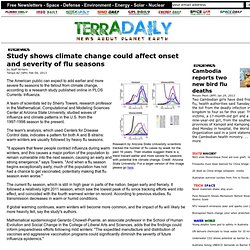
A team of scientists led by Sherry Towers, research professor in the Mathematical, Computational and Modeling Sciences Center at Arizona State University, studied waves of influenza and climate patterns in the U.S. from the 1997-1998 season to the present. The team's analysis, which used Centers for Disease Control data, indicates a pattern for both A and B strains: warm winters are usually followed by heavy flu seasons.
"It appears that fewer people contract influenza during warm winters, and this causes a major portion of the population to remain vulnerable into the next season, causing an early and strong emergence," says Towers. "And when a flu season begins exceptionally early, much of the population has not had a chance to get vaccinated, potentially making that flu season even worse. " Rise in violence 'linked to climate change' 2 August 2013Last updated at 03:18 ET By Rebecca Morelle Science reporter, BBC World Service The researchers believe that war and personal conflicts are links to shifts in climate Shifts in climate are strongly linked to increases in violence around the world, a study suggests.
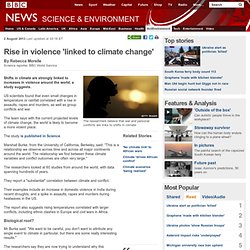
US scientists found that even small changes in temperature or rainfall correlated with a rise in assaults, rapes and murders, as well as group conflicts and war. Quantifying the Influence of Climate on Human Conflict. A rapidly growing body of research examines whether human conflict can be affected by climatic changes.
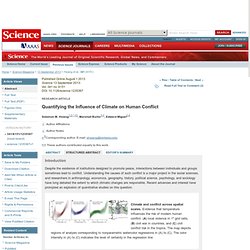
Drawing from archaeology, criminology, economics, geography, history, political science, and psychology, we assemble and analyze the 60 most rigorous quantitative studies and document, for the first time, a striking convergence of results. We find strong causal evidence linking climatic events to human conflict across a range of spatial and temporal scales and across all major regions of the world.